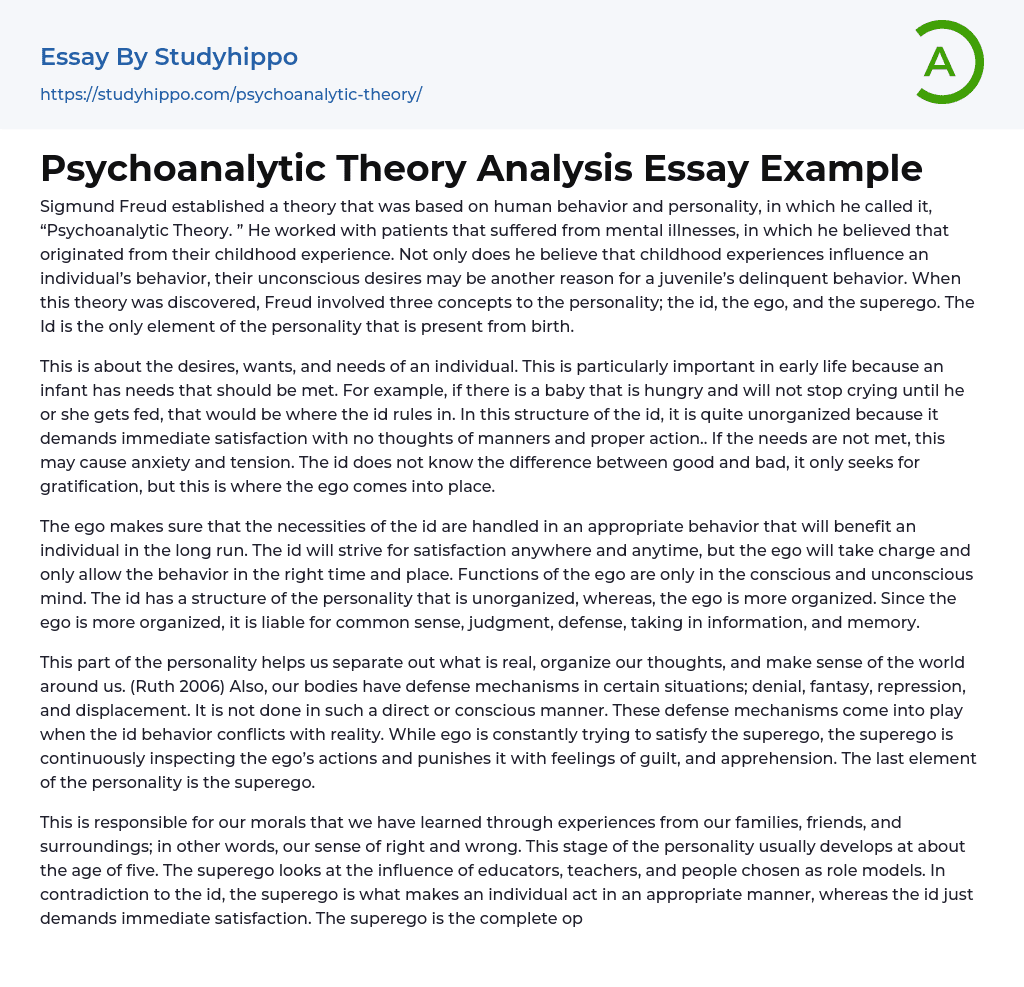Sigmund Freud formulated the "Psychoanalytic Theory" based on human behavior and personality. He examined patients with mental illnesses and linked their condition to childhood experiences. Alongside the impact of these experiences on behavior, Freud suggested that unconscious desires could influence delinquent behavior in young offenders. Within his theory of personality, Freud introduced three concepts: the id, the ego, and the superego. The id is the sole aspect of one's personality present since birth.
This paragraph emphasizes the significance of meeting an individual's desires, wants, and needs, particularly during infancy. It explains that the "id," a component within a person, fulfills immediate needs without considering appropriate behavior and not fulfilling these needs can cause anxiety and tension. However, the id doesn't differentiate between good and bad; its main goal is gratification. This is where the role of the "ego" bec
...omes essential.
The ego serves the individual's benefit by fulfilling the id's needs, unlike the id which seeks gratification without considering time or place. It controls and allows this behavior only when appropriate. It operates in both the conscious and unconscious mind, whereas the id lacks organization. In contrast to the id, the ego is structured and accountable for common sense, judgment, defense mechanisms, information processing, and memory.
According to Ruth (2006), the superego is the ultimate component of our personality, aiding in distinguishing reality, organizing thoughts, and comprehending the world. In addition, defense mechanisms such as denial, fantasy, repression, and displacement exist within our bodies. These defense mechanisms are not consciously or directly employed but are activated when behaviors from the id conflict with reality. The ego constantly strives to fulfill the demands
of the superego while being scrutinized by feelings of guilt and apprehension.
The superego, developed around the age of five, is responsible for our morals. We learn these morals from our families, friends, and surroundings. Educators and role models also influence the development of the superego. Unlike the id's focus on immediate satisfaction, the superego guides individuals to act appropriately. The ego acts as a mediator between the id and the superego.
According to Freud, the ego is responsible for appropriate behavior, while rules and standards set by parents are established by the superego. Following these rules can result in a sense of accomplishment. Freud believed that individuals with a well-developed ego can maintain a balance between the id and the superego. However, failure to achieve this balance can lead to problematic behavior in young individuals. Freud's theory was developed through his observations of patients and the advantageous qualities he observed that supported his hypothesis.
As he listened and analyzed his patients, he became certain that their problems originated from their childhood encounters. This theory aids in comprehending the significance of an individual's childhood experience. Every event occurring in a child's early years will impact them in some manner. For instance, if a young boy were to experience molestation, he might develop into a disruptive individual who could potentially molest others either seeking revenge or due to a lack of understanding about the wrongness of such actions at a tender age.
- Abnormal Psychology essays
- Abraham Maslow essays
- Attachment Theory essays
- Authority essays
- Behaviorism essays
- Classical Conditioning essays
- Cognitive Psychology essays
- Counseling essays
- Developmental Psychology essays
- Educational Psychology essays
- Erik Erikson essays
- Family Therapy essays
- Jean Piaget essays
- Maslow's Hierarchy Of Needs essays
- Mental Health essays
- Operant Conditioning essays
- Personality Psychology essays
- Positive Psychology essays
- Psychoanalysis essays
- Psychotherapy essays
- Sigmund Freud essays
- Social Psychology essays
- Stanford Prison Experiment essays
- Supersize Me essays
- Experiment essays
- Explorer essays
- Hypothesis essays
- Observation essays
- Qualitative Research essays
- Research Methods essays
- Theory essays




